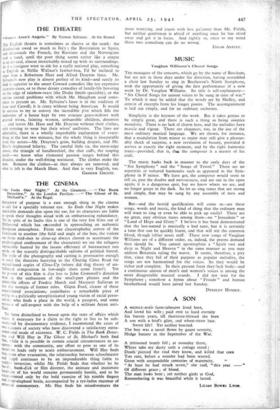THE THEATRE
',women Aren't Angels." By Vernon Sylvaine. At the Strand.
THE English theatre is sometimes as elusive as the snark: the Elizabethan owed so much to Italy ; the Restoration to Spain, and afterwards the French, the Russians and the Norwegians took a hand, until the poor thing seems rather like a corpse in an air-raid, almost inextricably mixed up with its surroundings. So if a foreigner were to Ak for a really national play, something as English as Nellie Wallace's feather-boa, I'd be inclined to ,thipw him a Robertson Hare and Alfred- Drayton farce. Mr. Sylvaine's new play is almost perfect' of its kind—and surely its kind is superior to the smart Coward comedies like too expensive cigarette-cases, or to those dreary comedies of family-life hovering on the edge of rainbow-tears (the Dodie Smith speciality), or the serous unreal problems with which Mr. Maugham used some- times to present us. Mr. Sylvaine's farce is in the tradition of Lear and Carroll; it is crazy without being American. It would be useless to try to convey the incredible plot which fills the bedrooms of a house kept by two evacuee grass-widows with grieved wives, fainting women, unbe,arable children, deserters ... and leaves Mr. Hare and Mr. Drayton without' their clothes, with nothing -to wear but their wives' uniforms. The lines are admirable, there is a wholly improbable explanation of every- thing in the last two minutes, but the whole thing is inseparable from the actors—Mr. Drayton's grim, bulldog despair, and Mr. Hare's frightened hilarity. The careful little tie, the razor-edge crease, the triangle of handkerchief, the shot cuffs, the soaping hands—we know what elemental passion surges behind this disguise, under the well-fitting waistcoat. The clothes make the man. Remove the clothes—as they always are removed, and what is left is the March Hare. And that is very English, too.
GRAHAM GREENE.


























 Previous page
Previous page